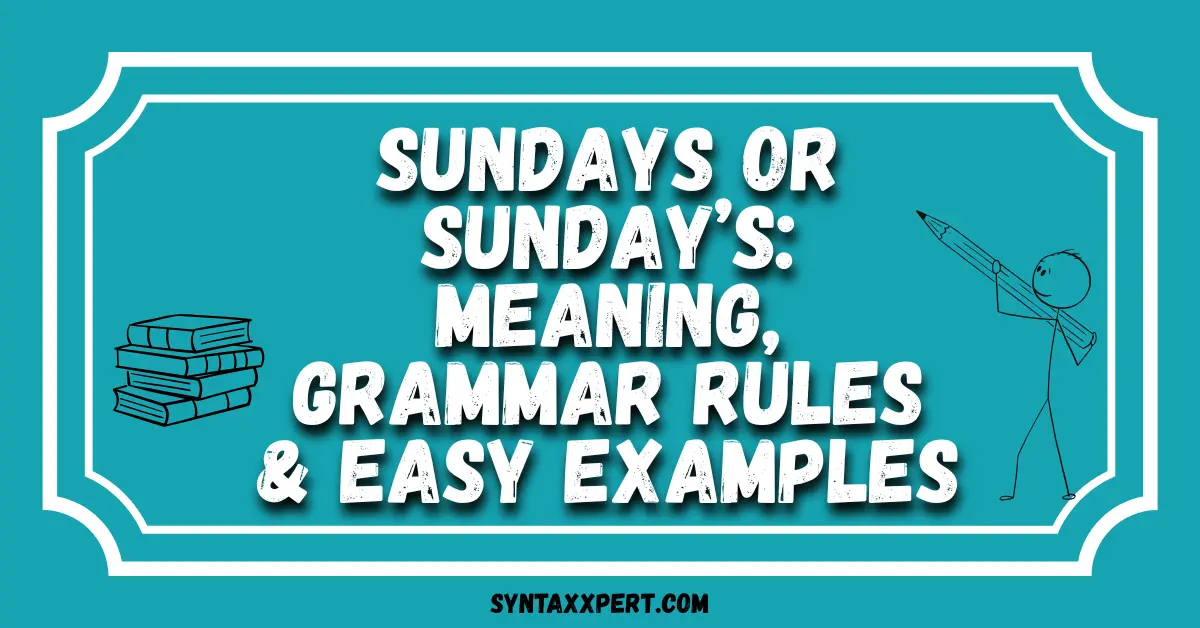Sundays or Sunday’s — this tiny apostrophe confuses even native speakers. Yet, mastering its usage can make your writing look polished, precise, and professional. Let’s break down what each form means, when to use it, and how to remember the rules easily.
What Does “Sundays” Mean?
“Sundays” is the plural form of the noun Sunday. You use it when referring to more than one Sunday.
✅ Examples:
- I go jogging on Sundays.
- The store opens late on Sundays.
- We visit Grandma on Sundays.
💡 Fact: Just like Mondays or Fridays, adding an “s” to a day of the week pluralizes it — no apostrophe needed.
| Form | Meaning | Example |
| Sunday | Singular day | I’ll see you this Sunday. |
| Sundays | Plural days | We meet on Sundays. |
What Does “Sunday’s” Mean?
“Sunday’s” is the possessive form of the word Sunday. It shows that something belongs to Sunday or happens on that specific Sunday.
✅ Examples:
- Sunday’s meeting was canceled. (The meeting belonging to Sunday)
- I enjoyed Sunday’s sunshine. (The sunshine of Sunday)
- Sunday’s breakfast was delicious. (Breakfast on Sunday)
📘 Grammar Tip: If something belongs to a single Sunday, use an apostrophe + s (‘s). If something belongs to multiple Sundays, you’ll use Sundays’ (apostrophe after s) — e.g., The Sundays’ events were canceled.
Sundays vs Sunday’s: The Key Difference
It’s all about plural vs. possessive.
| Word | Grammar Role | Usage Example |
| Sundays | Plural noun | “We take walks on Sundays.” |
| Sunday’s | Singular possessive | “Sunday’s lunch was amazing.” |
| Sundays’ | Plural possessive | “The Sundays’ gatherings are always fun.” |
🧠 Quick Trick to Remember:
If you can replace the word with many Sundays, use Sundays. If you can replace it with of Sunday, use Sunday’s.
When to Use “Sundays” in a Sentence
Use Sundays when:
- Talking about recurring events.
- Referring to multiple Sundays in general conversation.
- Expressing habitual actions.
✅ Example Sentences:
- I attend yoga class on Sundays.
- Sundays are perfect for sleeping in.
- We take family photos every Sunday, or rather, on Sundays.
📊 Usage Insight: According to Google Ngram Viewer data, “Sundays” appears nearly 3× more frequently in modern writing than “Sunday’s” because people more often discuss habits or routines than possession.
When to Use “Sunday’s” in a Sentence
Use Sunday’s when:
- Describing something belonging to Sunday.
- Talking about a specific Sunday.
- Indicating a time or event on that day.
✅ Example Sentences:
- Sunday’s weather looks promising.
- Don’t forget about Sunday’s sermon.
- Sunday’s deadline is approaching.
📘 Grammar Note: If you’re unsure, check whether the sentence implies ownership (belonging). If yes — add the apostrophe.
Common Grammar Mistakes with “Sundays” and “Sunday’s”
Even experienced writers make these errors. Here are the most frequent ones:
| ❌ Wrong | ✅ Correct | Why |
| I rest on Sunday’s. | I rest on Sundays. | No ownership; plural needed. |
| Sundays weather is nice. | Sunday’s weather is nice. | Possession required. |
| We go out on Sunday’s. | We go out on Sundays. | Habitual action = plural. |
💬 Quote from a Grammar Expert:
“Apostrophes are not decoration marks — they serve ownership or omission.” — The English Grammar Book, Oxford Press
Sundays’ – The Rarely Used Form
“Sundays’” (apostrophe after s) is the plural possessive form. You’ll only use it when something belongs to multiple Sundays.
✅ Examples:
- The Sundays’ gatherings were joyful.
- The Sundays’ sermons focused on peace.
Though correct, “Sundays’” is rarely used in everyday writing. Most people simply rephrase the sentence for clarity.
Apostrophe Rules for Days of the Week
Here’s a simple guide to help you decide when to add an apostrophe:
| Form | Use Case | Example |
| Day + s | Plural | “Mondays are tiring.” |
| Day + ’s | Singular possessive | “Monday’s meeting was long.” |
| Day + s’ | Plural possessive | “Mondays’ traffic is terrible.” |
💡 Quick Grammar Rule:
No apostrophe = plural Apostrophe + s = belongs to one s + apostrophe = belongs to many
Case Study: “Sunday’s Best” vs “Sundays Best”
Let’s look at a real-world example — the phrase “Sunday’s Best”.
This idiom means your finest clothing (what people wear to church on Sunday).
✅ Correct: She wore her Sunday’s best dress. ❌ Incorrect: She wore her Sundays best dress.
👉 Here, “Sunday’s” shows possession — the best clothes belonging to Sunday.
Real Examples from Everyday English
| Context | Correct Usage | Explanation |
| Routine | “We have brunch on Sundays.” | Plural – recurring action |
| Specific event | “Sunday’s match was exciting.” | Possessive – single event |
| Belonging | “Sunday’s sermon was inspiring.” | Something that belongs to Sunday |
| Habit | “She naps on Sundays.” | Plural – habitual action |
How to Remember the Difference (Simple Trick)
Try this quick replacement test:
- Replace with many Sundays → if it makes sense → use Sundays.
- Replace with of Sunday → if it makes sense → use Sunday’s.
Examples:
- I go out on Sundays → ✅ “I go out on many Sundays.”
- Sunday’s weather → ✅ “Weather of Sunday.”
Why “Sundays or Sunday’s” Matters for English Learners
Understanding these forms improves:
- Writing clarity – no more confusing plural/possessive mistakes.
- Grammar accuracy – crucial for professional or academic writing.
- Confidence – helps you express time, ownership, and repetition properly.
🧩 Did You Know? “Sundays or Sunday’s” is one of the most searched grammar confusions among ESL learners on Google, alongside “its vs it’s” and “your vs you’re”.
READ MORE >>> Contracter or Contractor: Correct Spelling, Meaning & Usage
Additional Notes on Apostrophes and Plurals
Apostrophes are often misused in plural words — especially with days, dates, and family names.
| ❌ Wrong | ✅ Correct | Rule |
| The Johnson’s | The Johnsons | No apostrophe in plurals. |
| 1990’s | 1990s | Years don’t need apostrophes. |
| Sunday’s are busy. | Sundays are busy. | Habitual = plural, no apostrophe. |
FAQs About Sundays or Sunday’s
What’s correct: “On Sunday’s” or “On Sundays”?
✅ “On Sundays” is correct when you mean every Sunday. Use “on Sunday’s” only if something belongs to Sunday (e.g., Sunday’s event).
Is “Sunday’s” plural or possessive?
It’s possessive — showing ownership (e.g., Sunday’s sermon).
What is the plural possessive of Sunday?
It’s Sundays’, used rarely, for multiple Sundays.
Can you use Sundays as an adverb of frequency?
Yes! “I go running Sundays” is an accepted casual form.
How can I remember the difference easily?
Think:
- Sundays = many Sundays
- Sunday’s = of Sunday
Conclusion
Choosing between Sundays or Sunday’s depends on whether you’re showing plurality or possession. Use Sundays for recurring or multiple days, and Sunday’s when something belongs to Sunday. And if you ever see Sundays’, remember it’s the plural possessive — grammatically correct but rarely used.
✨ In short:
Sundays = more than one Sunday. Sunday’s = something belonging to Sunday. Sundays’ = belonging to multiple Sundays.
🏁 Final Grammar Recap Table
| Form | Type | Meaning | Example |
| Sunday | Singular | One specific day | “This Sunday is my birthday.” |
| Sundays | Plural | More than one Sunday | “We meet on Sundays.” |
| Sunday’s | Singular possessive | Belonging to one Sunday | “Sunday’s lunch was great.” |
| Sundays’ | Plural possessive | Belonging to many Sundays | “The Sundays’ gatherings were joyful.” |

I’m Luna Hazel, a grammar expert here to help you master the art of clear, confident writing. Let’s make every word count!

